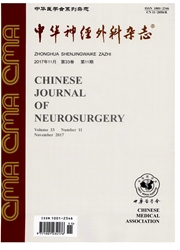

 中文摘要:
中文摘要:
目的 探讨手术和辅助放化疗治疗多形性胶质母细胞瘤(GBM)患者预后的影响因素.方法 回顾性分析2004年12月至2014年12在广州军区广州总医院神经外科手术治疗,术后辅助放化疗的61例GBM患者的临床资料,评价性别、年龄、病变部位、病变数量、肿瘤体积、病程时间、术前Kamofsky功能状态评分(KPS)、手术时长、手术出血量、肿瘤残余体积、手术切除程度、术后并发症、肿瘤二次切除手术、放疗、化疗、同步放化疗16个因素对患者生存期的影响.对Kaplan-Meier单因素分析差异有统计学意义的指标行多因素Cox回归分析.结果 61例患者生存时间为1~63个月,中位时间为14.0个月,1年、2年和5年的生存率分别为75.4%、34.4%和1.6%.Kaplan-Meier法单因素分析显示,术前KPS评分、手术时间、肿瘤残余、全部切除、放疗、化疗及是否同步放化疗是影响患者生存期的因素;多因素Cox回归分析显示,术前KPS评分(OR=0.302,95%CI:0.153~0.597,P=0.001)、肿瘤残余体积(OR =0.225,95% CI:0.114 ~0.441,P=0.000)及是否同步放化疗(OR=0.275,95% CI:0.128 ~0.591,P=0.001)是影响GBM患者预后的独立因素.结论 手术仍然是治疗GBM最重要的手段,其中术前KPS评分≥70分,术后肿瘤残余体积≤3 cm3,术后行同步放化疗可延长患者的生存期.
 英文摘要:
英文摘要:
Objective To investigate the prognostic influencing factors in patients with glioblastoma multiforme (GBM) after surgery and adjuvant radiochemotherapy. Methods From December 2004 to December 2014, the clinical data of 61 patients with GBM operated and treated with postoperative adjuvant radiochemotherapy at the Department of Neurosurgery, Guangzhou General Hospital of Guangzhou Military Command were analyzed retrospectively. The influence of 16 factors on the survival time of the patients were evaluated, including gender, age, lesion site, number of lesions, tumor volume, disease duration, preoperative Karnofsky Performance Scale (KPS) score, operation duration, operative bleeding volume, tumor residual volume, extent of resection, postoperative complications, secondary tumor resection, radiotherapy, chemotherapy, and concurrent radiochemotherapy. Multivariate Cox regression analysis was conducted for the indices of the differences with statistical significance of Kaplan-Meier single factor analysis. Results The survival time of 61 patients was 1 to 63 months, and the median survival time was 14.0 months, 1-year, 2-year, and 5-year survival rates were 75.4%, 34.4% and 1.6%, respectively. The univariate analysis of Kaplan-Meier method showed that preoperative KPS score, operation time, residual tumor, total resection, radiotherapy, chemotherapy and concurrent radiochemotherapy were the factors of impacting on the survival time of patients. Multivariate Cox regression analysis showed that preoperative KPS score ( OR, 0. 302, 95% CI 0. 153 - 0. 597, P = 0. 001 ) , residual tumor volume ( OR, 0. 225, 95% CI 0. 114 -0. 441, P =0.000) and concurrent radiochemotherapy ( OR, 0. 275, 95% CI 0. 128 -0. 591, P = 0. 001 ) were the independent factors for impacting the prognosis of patients with GBM. Conclusions Surgery is still the most important means for the treatment of GBM. The preoperative KPS score is ≥70, the postoperative residual tumor volume is 〈 3 cm3, and postoperative concurrent radioche
 同期刊论文项目
同期刊论文项目
 同项目期刊论文
同项目期刊论文
 DAB2IP loss confersthe resistance of prostate cancer to androgen deprivation therapy throughactivati
DAB2IP loss confersthe resistance of prostate cancer to androgen deprivation therapy throughactivati Silibinin inhibits b-catenin/ZEB1 signaling and suppresses bladder cancer metastasis via dual-blocki
Silibinin inhibits b-catenin/ZEB1 signaling and suppresses bladder cancer metastasis via dual-blocki 期刊信息
期刊信息
